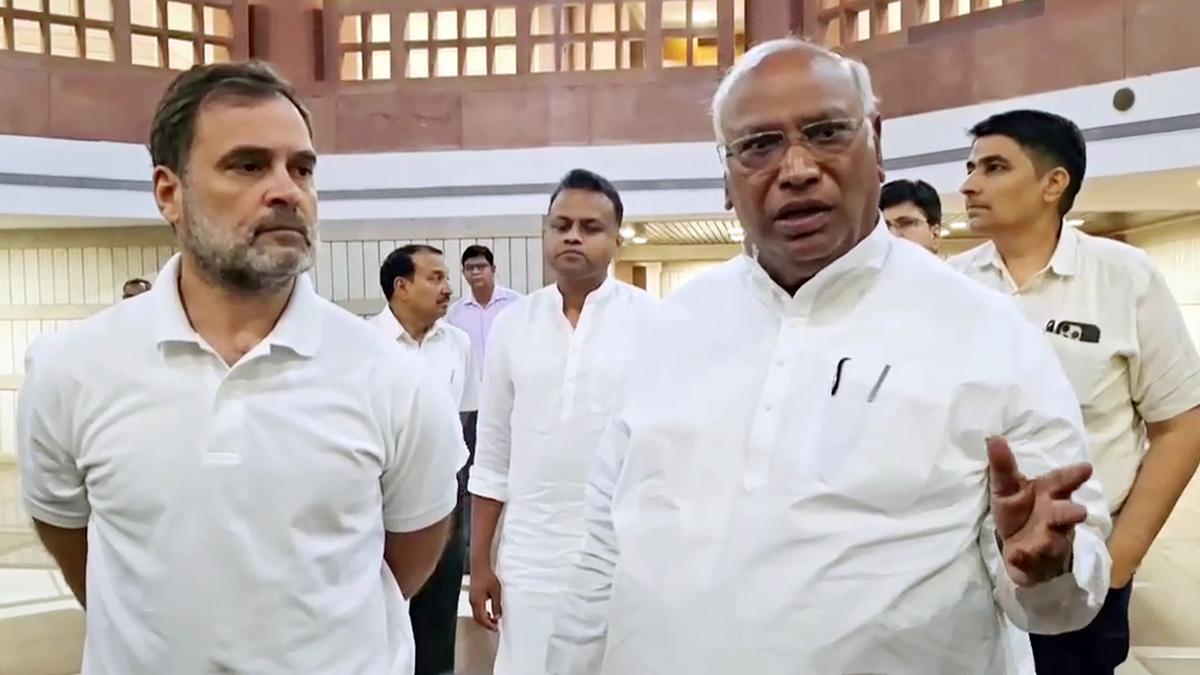Lok Sabha LoP and Congress MP Rahul Gandhi and party president Mallikarjun Kharge speak to the media after attending the all-party meeting convened by the central government, in New Delhi. File.
| Photo Credit: ANI
The shifting Congress responses to the Pahalgam terror attack, in which 26 people were killed in Jammu and Kashmir’s (J&K) most popular tourist destination, offers insight into the delicate balancing act the party has to perform on sensitive issues like nationalism and terrorism.
Congress President Mallikarjun Kharge, a day after the Pahalgam attack, stated, “This is not a time for partisan politics.”
Editorial | Sent messages: On Jammu and Kashmir post Pahalgam terror attack
But the Congress Working Committee (CWC) nuanced this stance, balancing support for the government’s position on Pakistan with a call for accountability.
“It is imperative that a comprehensive analysis is conducted into the intelligence failures and security lapses that enabled such an attack in a Union Territory — an area directly under the purview of the Union Home Ministry,” the CWC resolution said.
Leader of the Opposition in Lok Sabha Rahul Gandhi, at an all-party meeting chaired by Defence Minister Rajnath Singh on Pahalgam attack on April 24, asserted that it was “sheer luck that the number of people killed were below 30 and more people didn’t get massacred”.
The party also didn’t fight shy in clearly stating the victims were identified and killed on the basis of their faith. “The deliberate targeting of Hindus was done to inflame passions across the country,”the CWC noted.
Unwilling to portray the terror attack in Hindu-Muslim binary, the CWC resolution pointed out how both the people of Jammu and Kashmir and the regional parties condemned the attacks and paid respects to the local guides and pony-owners, one of them “died while selflessly trying to protect the tourists to uphold the idea of India”.
“However, it is shocking that the BJP is exploiting this grave tragedy through official and proxy social media platforms to sow further discord, mistrust, polarization, and division at a time when unity and solidarity are most needed,”the CWC noted.
Unlike the BJP’s blend of Hindutva and rashtravad (nationalism), the Congress party’s idea of nationalism does not inherently focus on any religious or cultural identity.
“The idea of nationalism for Congress is one that binds people together. On the other hand, the pseudo-nationalism of the BJP-RSS seeks to divide society and our people,” the resolution, adopted at the Ahmedabad session of the All India Congress Committee (AICC) on April 9, stated.

The Congress does not associate extremism or terrorism with a particular community or religion. For years, the party has maintained that terrorists have no religion and has consciously avoided using terms like “Islamic terror” or “jihad” in its official communications.
This position has often led the BJP to accuse the Congress of being “soft on terror” due to what it describes as appeasement politics.
During the 26/11 attacks in Mumbai in 2008, Narendra Modi—then Chief Minister of Gujarat—held a press conference outside the Trident Hotel while anti-terror operations were still ongoing. “The country needs a government that acts, not one that watches while terrorists strike at will,” Mr Modi said on November 28.
With multiple terror attacks taking place during the Congress-led United Progressive Alliance (UPA) regime, and media narratives painting the Manmohan Singh government as “weak and indecisive,” the label of being “soft on terror” stuck to the Congress.
In sharp contrast, the Modi government not only conveyed a sense of decisiveness through actions like the Balakot air raids and surgical strikes but, with the support with a large section of the media, succeeded in crafting a narrative that questioning the government after a terror strike is equivalent to questioning the Indian state itself.
That framing has left the Congress performing a delicate act — demonstrating national solidarity while holding the government accountable, and retaining its ideological commitment to inclusive nationalism in an increasingly polarized political landscape.
Published – April 27, 2025 10:26 am IST
